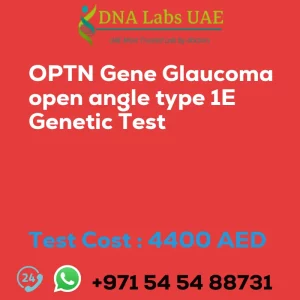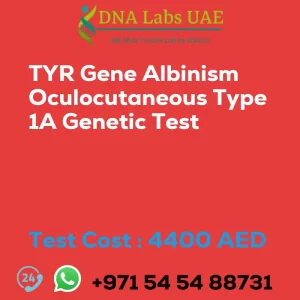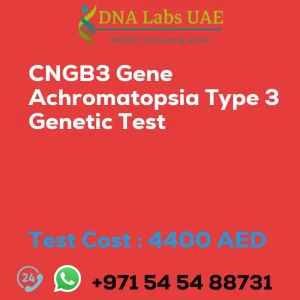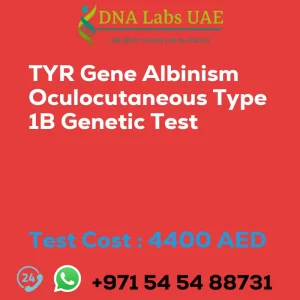EFEMP1 Gene Doyne Honeycomb Retinal Dystrophy Genetic Test
Welcome to DNA Labs UAE, where we offer the EFEMP1 Gene Doyne Honeycomb Retinal Dystrophy Genetic Test. This test is designed to identify mutations in the EFEMP1 gene that may be responsible for Doyne honeycomb retinal dystrophy (DHRD), a rare genetic disorder that affects the retina of the eye.
Test Details
DHRD is characterized by the formation of small, yellowish deposits called drusen in the macula, which can lead to progressive vision loss. Our Next-generation sequencing (NGS) genetic testing utilizes advanced technology to sequence the entire EFEMP1 gene and identify any genetic variants that may be present.
NGS genetic testing can be performed using a small blood sample or a cheek swab, and results are typically available within a few weeks. This test not only helps confirm a diagnosis of DHRD but also provides information about the risk of passing the condition on to future generations.
Test Components and Price
Our EFEMP1 Gene Doyne Honeycomb Retinal Dystrophy Genetic Test is priced at 4400.0 AED. The test can be conducted using either blood or extracted DNA, or even just one drop of blood on an FTA Card.
Report Delivery
Once the test is conducted, the report will be delivered within 3 to 4 weeks.
Test Method
We utilize NGS technology for our EFEMP1 Gene Doyne Honeycomb Retinal Dystrophy Genetic Test. This advanced method allows for accurate and comprehensive sequencing of the EFEMP1 gene.
Test Type and Doctor
The EFEMP1 Gene Doyne Honeycomb Retinal Dystrophy Genetic Test falls under the category of Ophthalmology Disorders. It is recommended to consult with an Ophthalmologist for this test.
Test Department
Our Genetics department is responsible for conducting the EFEMP1 Gene Doyne Honeycomb Retinal Dystrophy Genetic Test.
Pre Test Information
Prior to conducting the EFEMP1 Gene Doyne Honeycomb Retinal Dystrophy Genetic Test, it is important to provide the clinical history of the patient. Additionally, a Genetic Counselling session will be conducted to draw a pedigree chart of family members affected with the EFEMP1 gene.
Genetic Counseling
We highly recommend genetic counseling for individuals considering the EFEMP1 Gene Doyne Honeycomb Retinal Dystrophy Genetic Test, as well as those who have already received a diagnosis. This counseling session will provide a clear understanding of the risks and benefits of testing, as well as the potential implications of the results.
At DNA Labs UAE, we strive to provide accurate and reliable genetic testing services. Contact us today to schedule your EFEMP1 Gene Doyne Honeycomb Retinal Dystrophy Genetic Test and take the first step towards understanding your genetic health.
| Test Name | EFEMP1 Gene Doyne honeycob retinal dystrophy Genetic Test |
|---|---|
| Components | |
| Price | 4400.0 AED |
| Sample Condition | Blood or Extracted DNA or One drop Blood on FTA Card |
| Report Delivery | 3 to 4 Weeks |
| Method | NGS Technology |
| Test type | Ophthalmology Disorders |
| Doctor | Ophthalmologist |
| Test Department: | Genetics |
| Pre Test Information | Clinical History of Patient who is going for EFEMP1 Gene Doyne honeycob retinal dystrophy NGS Genetic DNA Test. A Genetic Counselling session to draw a pedigree chart of family members affected with EFEMP1 Gene Doyne honeycob retinal dystrophy NGS Genetic DNA Test gene EFEMP1 |
| Test Details |
EFEMP1 gene is associated with Doyne honeycomb retinal dystrophy (DHRD), which is a rare genetic disorder that affects the retina of the eye. This disorder is characterized by the formation of small, yellowish deposits called drusen in the macula, which can lead to progressive vision loss. Next-generation sequencing (NGS) genetic testing is a powerful tool for identifying mutations in the EFEMP1 gene that may be responsible for DHRD. This test involves sequencing the entire EFEMP1 gene to identify any genetic variants that may be present. NGS genetic testing can be performed using a small blood sample or a cheek swab, and results are typically available within a few weeks. This test can help to confirm a diagnosis of DHRD, as well as provide information about the risk of passing the condition on to future generations. Genetic counseling is recommended for individuals who are considering NGS genetic testing for DHRD, as well as for those who have already received a diagnosis. This can help to ensure that individuals have a clear understanding of the risks and benefits of testing, as well as the potential implications of the results. |







